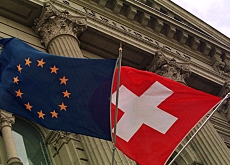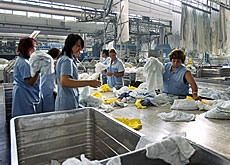Labour-accord ballot shows voter “pragmatism”

Pragmatism was behind the Swiss "yes" to extending a labour accord to the new European Union member states, political scientist Georg Lutz tells swissinfo.
But Lutz does not believe the result will undermine the rightwing – and traditionally eurosceptical – Swiss People’s Party, which had campaigned against the extension.
On Sunday Swiss voters agreed by a majority of 56 per cent to open the domestic labour market and give the new EU members the right to live and work in Switzerland.
Extension of the accord also means that Swiss citizens will have access to the labour markets of the ten new EU countries, which are mostly located in eastern Europe.
Many political pundits had predicted a close vote, but in the end just seven of the country’s 26 cantons – including Italian-speaking Ticino – voted against extending the accord.
swissinfo: Is the result really a surprise given the strong backing for extending the accord from the Swiss business sector?
Georg Lutz: I was quite surprised at how clear the result was. But it is understandable when you look at the campaign the “yes” side ran. It was an important issue for the business sector and it was quite an extensive campaign right up to the very last minute.
swissinfo: What about the “no” campaign? Did opponents fail to hit the mark?
G.L.: I would say so. Normally people would be afraid of the EU and its new members because it is part of the unknown and nobody knew what the consequences would be.
This time it was the other way around. Many people actually feared the possible consequences of a “no” vote for the bilateral treaties Switzerland has with the EU. That was one of the reasons that led the eurosceptics to a certain degree of pragmatism and to vote “yes”.
swissinfo: What were the reasons behind that pragmatism? The results show that even some rural areas voted in favour, albeit by narrow margins.
G.L.: One of the reasons was that even the rightwing parties were politically split. The business wing of the rightwing parties campaigned heavily in favour, so it wasn’t possible to make this a pure anti- or pro-EU topic as happened in the past with things like last June’s vote on whether Switzerland should join the EU’s Schengen/Dublin accords [governing cross-border crime and asylum].
This split within the rightwing parties had the effect that… the usual arguments against EU membership did not fall on solid ground.
swissinfo: Will the People’s Party be able to recover from the divisions it displayed in the run-up to this vote?
G.L.: I am sure it will be able to. The People’s Party is still the strongest political force in the country and I don’t think this result will lead to a massive split within the party.
Having said that, one of the problems for the rightwing parties is that there is no official debate about whether Switzerland should join the EU. And that’s why this vote and the one in June were important for them.
swissinfo: What happens next in terms of the future of Swiss-EU relations?
G.L.: Discussions will focus on whether Switzerland should reactivate its attempt to join the EU, which was officially submitted to Brussels in 1992 [but which is currently on ice].
But it’s clear to everyone that at this moment in time it’s rather unlikely that Switzerland will join the EU.
swissinfo-interview: Faryal Mirza
Final result of Sunday’s vote:
Yes: 1,457,807 votes (56%).
No: 1,146,784 votes (44%).
Voter turnout was slightly above average at 54%.
A labour accord between Switzerland and the EU is to be gradually extended to include the ten new member states.
The group is made up of the three Baltic republics (Latvia, Lithuania, Estonia), Poland, the Czech Republic, Slovakia, Hungary, Slovenia, Malta and Cyprus.

In compliance with the JTI standards
More: SWI swissinfo.ch certified by the Journalism Trust Initiative

You can find an overview of ongoing debates with our journalists here. Please join us!
If you want to start a conversation about a topic raised in this article or want to report factual errors, email us at english@swissinfo.ch.